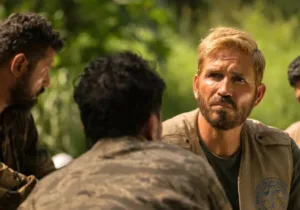In scripture, the oath represents the heart of a man. It is his word, his bond, his promise, his commitment. It is his essence. We see the power of the oath in Abraham’s relationship with God, in the promises God made to His people, in the fractured brotherhood of Jacob and Esau, in Joseph’s commitment to his dying father, in Pharaoh’s response to Joseph, in the way Moses and Joshua led their people, in the friendship between David and Jonathan, in the distress of King Herod, and in the denials of Peter.
As a soldier in the U.S. Army, Bradley Manning took an oath. He broke it when he decided to download thousands of classified documents—including secret commando operations targeting al Qaeda in Pakistan, undisclosed joint U.S.-allied operations in Afghanistan, an effort by the Bush and Obama administrations to remove highly enriched uranium from Pakistan, discussions between Washington and Seoul about Korean reunification, inducements offered to various governments to secretly accept Guantanamo detainees, revelations that Beijing had hacked into Google’s operations in China, secret understandings between the U.S. and its allies in the Middle East about targeting terror groups, debriefing evaluations of Guantanamo detainees, battlefield footage, intelligence-gathering operations, internal State Department cables, secret cables between U.S. and foreign diplomats—and hand them over to WikiLeaks, whose founder openly admits that he wants to “bring down many administrations that rely on concealing reality, including the U.S. administration.”
Manning seemed to share the anarchist beliefs of WikiLeaks, boasting before being caught about his role in spreading “worldwide anarchy in CSV format,” a reference to the kind of files he surrendered to Julian Assange. Manning braggingly—and erroneously—called his crime “the largest data spillage in American history.” In fact, what Manning perpetrated was the purposeful, premeditated publication of stolen national-security secrets. This was not a leak or a spill. He knew as much because he pled guilty to several counts of espionage-related crimes.
But President Barack Obama, in the eleventh hour of his administration, commuted Manning’s sentence. He did so over the objections of his secretary of defense and intelligence officials. He did so despite what his first secretary of state said of Manning’s crimes: It was Hillary Clinton who called Manning’s handover of secret diplomatic cables “an attack on America’s foreign policy interests” that “puts people’s lives in danger, threatens our national security and undermines our efforts to work with other countries to solve shared problems.”
But on this issue—as on pulling back from Afghanistan and withdrawing from Iraq and leading from behind in Libya and erasing red lines in Syria and everything else—Obama knew best.
For his part, the deeply confused and naïve Manning said he was motivated by the notion that “the world would be a better place if states would not make secret deals with each other.” What a silly notion. In fact, we all know from personal experience that secrecy often serves an important purpose. For instance, if Assange and Manning—both of whom have had their share of legal troubles—really believed secrecy was so bad, why wouldn’t they post their consultations with counsel on YouTube or share their defense strategies with the world on WikiLeaks?
The answer is the very same reason why nation-states keep some things secret. It is often secrecy—not transparency—that protects us and keeps the world from spinning out of control.
The Assanges and Mannings of the world will never accept it, but shadows and secrets are necessary to conduct diplomacy and carry out the sort of national-security strategy that deters and limits wars. That’s one of the sad ironies of Assange’s WikiLeaks. By exposing secret decisions and actions that relate to foreign policy and national security, he thinks he is promoting peace. But in truth, his handiwork is doing the very opposite: It has a chilling effect on the very sorts of exchanges that avert war or limit its effects.
History shows us the benefit of shadows.
Could Teddy Roosevelt have prevented a war over Venezuela, or ended a war between Russia and Japan, without diplomatic ambiguities and shadows?
Could the Allies have orchestrated their Calais deception before D-Day or bludgeoned Hitler’s war machine in a WikiLeaks era, with every conversation and casualty exposed to the world?
Could Franklin D. Roosevelt have launched the Manhattan Project, or Truman used its fruits to end World War II, without the shadow of secrecy?
Could John F. Kennedy and Khrushchev have negotiated a way around World War III if there were no shadows for back-channel diplomacy?
Could Reagan have won the Cold War without launching—from the shadows—his economic, intelligence, and technological assaults against the Soviet state?
To be sure, we know about these episodes today—and can learn from them—because secret records, cables, and diaries have been declassified. But if they had been revealed in real-time—or if the principals thought what they were saying, doing, and promising would be exposed in short order—history would be very different.
In short, some things need to be classified. And it’s not Bradley Manning’s or Julian Assange’s or Edward Snowden’s responsibility or right to determine what to declassify. That’s a job for Congress. Implicit in a representative system like that of the United States is the notion that the people delegate certain aspects of governing to their representatives. One of the many things we delegate to our representatives is determining what should be kept secret about our foreign policy and national security, what should not, and how and when to go about declassifying that information.
Tellingly, this war on secrecy waged by Manning, Assange, Snowden, and their fellow travelers is one-sided. They’ve aired the military strategy, diplomatic planning, and dirty laundry of America and its allies—but not that of America’s enemies. There is no Iranian, North Korean, Taliban, ISIS, or al Qaeda equivalent to WikiLeaks. And whereas much of the Western world tolerates and some even applaud people like Assange and Manning, the Russian and Chinese governments simply erase people who expose their secrets.
In other words, WikiLeaks, whether unintentionally or purposely, puts the United States and its allies at a disadvantage. Some will say this has always been true of democratic governments vis-à-vis their authoritarian foes. But timing is everything. And WikiLeaks is shrinking the amount of time between policy formation, policy execution, and public airing—and thus shrinking the shadows where American foreign and defense policy can work.
—
Alan Dowd is a contributor to Providence and a senior fellow with the Sagamore Institute Center for America’s Purpose.
Photo Credit:







 Sponsor a student for Christianity & National Security 2024
Sponsor a student for Christianity & National Security 2024